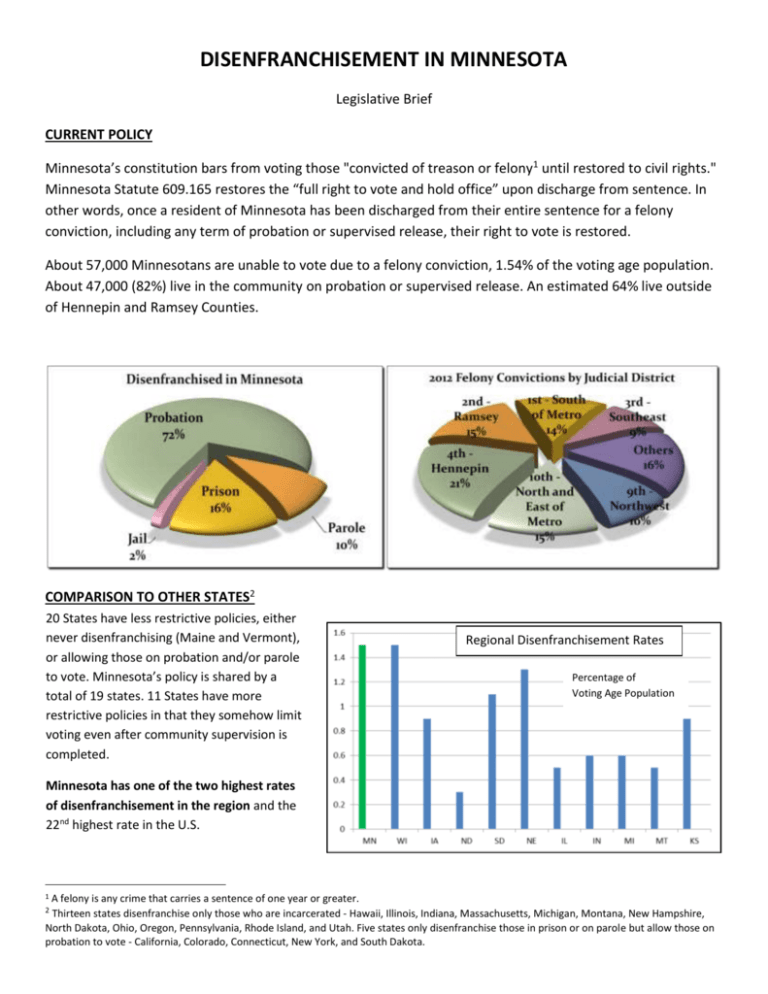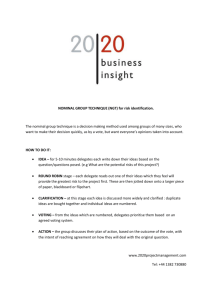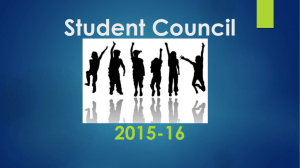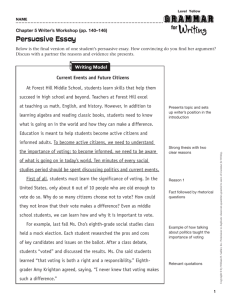disenfranchisement in minnesota - Minnesota Unitarian Universalist
advertisement

DISENFRANCHISEMENT IN MINNESOTA Legislative Brief CURRENT POLICY Minnesota’s constitution bars from voting those "convicted of treason or felony1 until restored to civil rights." Minnesota Statute 609.165 restores the “full right to vote and hold office” upon discharge from sentence. In other words, once a resident of Minnesota has been discharged from their entire sentence for a felony conviction, including any term of probation or supervised release, their right to vote is restored. About 57,000 Minnesotans are unable to vote due to a felony conviction, 1.54% of the voting age population. About 47,000 (82%) live in the community on probation or supervised release. An estimated 64% live outside of Hennepin and Ramsey Counties. COMPARISON TO OTHER STATES2 20 States have less restrictive policies, either never disenfranchising (Maine and Vermont), or allowing those on probation and/or parole to vote. Minnesota’s policy is shared by a total of 19 states. 11 States have more restrictive policies in that they somehow limit voting even after community supervision is completed. Regional Disenfranchisement Rates Percentage of Voting Age Population Minnesota has one of the two highest rates of disenfranchisement in the region and the 22nd highest rate in the U.S. 1 A felony is any crime that carries a sentence of one year or greater. Thirteen states disenfranchise only those who are incarcerated - Hawaii, Illinois, Indiana, Massachusetts, Michigan, Montana, New Hampshire, North Dakota, Ohio, Oregon, Pennsylvania, Rhode Island, and Utah. Five states only disenfranchise those in prison or on parole but allow those on probation to vote - California, Colorado, Connecticut, New York, and South Dakota. 2 DISENFRANCHISEMENT IN MINNESOTA Legislative Brief RACIAL DISPARITIES AFRICAN AMERICAN DISENFRANCHISEMENT SELECTED STATES 7.4 of African-American and 5.9% of American Indian Minnesotans are disenfranchised (compared to 1.1% of White Minnesotans). Minnesota has the 15th highest rate of African American disenfranchisement in the U.S. About 13,000 (22% of total) disenfranchised are African American. Restoring the vote to probationers and parolees would reduce Minnesota’s African American disenfranchisement rate to 2.7%. Percent of African American Voting Age Population HISTORY Felon disenfranchisement is rooted in ancient practices of “civil death” for those convicted of capital offenses. Minnesota’s constitution also restricted the right to vote to white males over 21 and “Persons of Indian blood…who have adopted the language customs and habits of civilization.” Criminal Justice System Changes In the 1860’s: • • • There were less than 75 felony crimes in statute. There was no probation, so all felony convictions resulted in prison. Just over 30 people were in prison, about .02 percent of the voting age population then. Today: • • • There are 368 felony crimes. About 75 percent of felonies result in probation. About 1.5% percent of our voting age population is disenfranchised. Minnesota’s disenfranchisement rate is over four times greater than it was just 40 years ago. DISENFRANCHISEMENT IN MINNESOTA Legislative Brief PUBLIC SAFETY Allowing people to vote while on community supervision may help to reduce recidivism – research links prosocial activities like voting to desistence in crime, individuals interviewed about losing the right to vote express a feeling of being an “outsider” because they cannot vote, and empirical study shows some correlation between voting and lower recidivism.3 A 2011 report by the Florida Parole Commission found that exprisoners who had their voting rights restored had recidivism rates of 11% compared to 33% for those who did not have their rights restored.4 The public safety benefit of pro-social activity is the primary reason allowing those on community supervision to vote is supported by the American Probation and Parole Officers Association. There is no evidence that disenfranchisement deters crime or lowers recidivism. AN EXAMPLE FOR CHILDREN Research has shown that children are more likely to vote as adults if they are raised by parents who engage in the voting process5 - it follows that the positive example of voting may lead to more positive participation in the community generally. ELECTION INTEGRITY AND SIMPLICITY According to a survey of county attorneys, in the 2008 elections 1,179 voters were investigated for voting while serving a felony sentence, resulting in 26 convictions. Many people are unsure of their voting rights. For example, in the 2012 election, a probation officer told a young woman that her five-year felony marijuana possession stay of adjudication sentence prevented her from voting. It took the Minnesota Supreme Court to provide clarification that she in fact could legally vote. Changing the law to disenfranchise those convicted of a felony only while in prison or jail will create a simple and bright line that will reduce this confusion and save taxpayer funded law enforcement resources. PUBLIC OPINION A 2002 national opinion poll showed that 60 percent of Americans surveyed supported restoring voting rights to parolees and probationers.6 3 See Uggen, C. and Manza, J. (2004) “Voting and Subsequent Crime and Arrest: Evidence from a Community Sample,” Columbia Human Rights Law Review, Vol. 36, No. 1, 193-215, 213. 4 Report can be accessed here: https://www.fcor.state.fl.us/docs/reports/2009-2010ClemencyReport.pdf 5 Gittell, Mary. "Empowering Citizens: From Social Citizenship to Social Capital." Social Capital and Social Citizenship. England: Lexington Books, 2003. 6 Manza, Jeff, Clem Brooks, and Christopher Uggen. 2004. “Public Attitudes Toward Felon Disenfranchisement in the United States.” Public Opinion Quarterly 68:276-87. DISENFRANCHISEMENT IN MINNESOTA Legislative Brief SUPPORTERS Restore the Vote Minnesota is a coalition of groups who support restoring the right to vote for those living in the community to make the law more clear and equitable, responsibly use taxpayer money, and encourage positive participation. Public Safety/Legal Conflict Resolution Center of MN Legal Rights Center MN Assoc. of Crim. Defense Lawyers MN Community Corrections Assoc. MN Corrections Association MN County Attorneys Association State Public Defender Faith Based Organizations ISAIAH Jewish Community Action Joint Religious Legislative Coalition MICAH (Metropolitan Interfaith Council on Affordable Housing) MN Catholic Conference MN Council of Churches MN Unitarian Universalist Social Justice Alliance Direct Service Organizations African Immigrant Services American Indian OIC Catholic Charities Goodwill/Easter Seals MN Mad Dads Minneapolis MN Adult and Teen Challenge MN Community Action Partnership MN Recovery Connection The Neighborhood Hub Northside Achievement Zone Open Access Connections St. Stephen’s Human Services Twin Cities Rise! Civic Engagement and Advocacy Organizations Advocates for Human Rights African American Leadership Forum ACLU of MN Children’s Defense Fund-MN Citizens for Election Integrity MN Common Cause MN Council on Crime and Justice Growth & Justice Integrated Community Solutions, Inc. Land Stewardship Project League of Women Voters MN Minneapolis branch of the NAACP Minneapolis Urban League MN AFL-CIO MN Coalition for the Homeless MN Council of Nonprofits MN Council on Foundations MN Innocence Project MN Neighborhoods Organizing for Change (NOC) MN Second Chance Coalition Minnesotans Standing Together to End Poverty (MNSTEP) MPIRG NAACP St. Paul Branch Organizing Apprenticeship Project People For the American Way Prison Policy Initiative R3 Collaborative SEIU Local 26 TakeAction MN Ten25Fifty World Without Genocide For more information contact Mark Haase, 612-819-0738, or Sarah Walker, 612-220-2070, or contact@restorethevotemn.org






